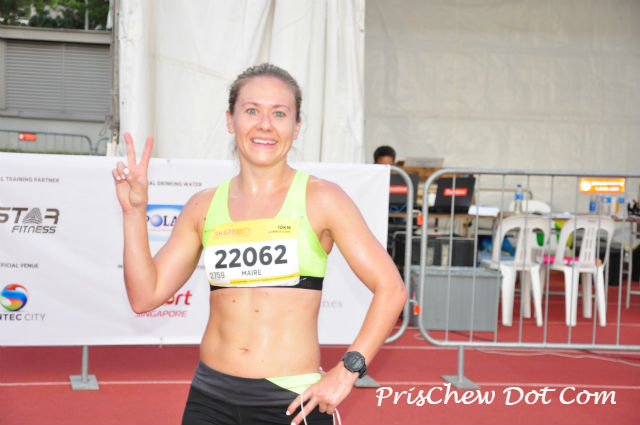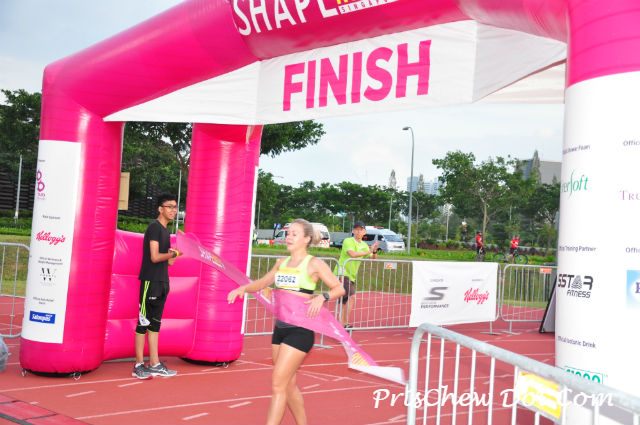Physiotherapist Máire Nic Amhlaoibh, 29, has always loved outdoor activities since her childhood days. As a little girl growing up in Ireland – where she comes from, she used to go for long walks and hikes with her family.
And at the age of 15, she eventually took up running, because of the influence from her older brothers, and has never looked back since.

Máire Nic Amhlaoibh.
Said Maire, “I am from a big family with five brothers who are all runners. My family is also very supportive of running and outdoor sports. When I was in Ireland, my dad used to come to all of my races and cheer me on. They also helped me out when I needed to go to training sessions and used to bring me to races.”
She added, “Running is a great way to stay fit. I am always trying to better my time and challenging myself with setting new running goals. That keeps me motivated.”
Podium place-getter in local and regional races
Maire migrated to Singapore about four years ago with her boyfriend and her competitive streak and her enthusiasm for running has remained strong. She has been picking up podium prizes in local and regional races too.
Some of her more recent placings include second position at multiple events, including the 10km races at OCC 3 TEN Run two weeks ago, as well as the Eco Run in April and the Performance Series in January, both this year.
She also did the Angkor Wat Half Marathon in Cambodia last year and came in second place for that, too.

Maire is a regular podium place-getter.
Said Maire, “The Angkor Wat race was a lovely run and the community was very supportive. It was also such a big occasion that the Prime Minster of Cambodia handed my award to me, so that was really cool.”
In fact, Maire hopes to return to the Angkor Wat Half Marathon this December, and she is aiming to win the race this time around.
Train every day
To do well at running, Maire believes in training every day, regardless of whether it is a run, or a form of cross training such as a swim or a bike ride.
She said “Never stop training. Even if you are feeling demotivated or you have had a bad race, get out there and run again. Even on days when you feel sluggish, run at an easy pace to keep the legs moving.”
She added “As a physiotherapist, I believe that if you move every day, it helps you to stay active and make exercise a regular habit.”
Maire herself does a combination of running, cross training and weights and resistance training to keep herself fit. She said, “I train every day. Four to five days are spent running and twice a week, I go to the gym for resistance training. Fridays are my low impact cross training day, where I would go for a bike ride, a swim or a pilates session.”

Maire believes in training every day.
Her long runs last for about 90 minutes to two hours depending on what she is training for. On average, Maire covers roughly 60 to 70 kilometres a week.
And to save some time and juggle her training with her physiotherapy work, Maire also added that she commutes from home to work by running. She said “I run home from work during the week and cover about 8km. By making my runs into my commute, it becomes easier to manage.”
On her non running days, Maire stresses the importance of doing weights or resistance training in terms of preventing running injuries. She said, “Weights is important for injury prevention; if you do not do that, you will end up with repetitive injuries. Speed sessions are also good if you want to run fast; that really improves your speed.”
Do not build up the mileage too fast
She also pointed out that a lot of runners tend to make the mistake of overloading and doing too much mileage. Said Maire, “Runners do too much too soon. For example new runners think that they have to run every day or the experienced runners have a new goal and they build up the mileage too fast. Running is so repetitive that this will cause you to end up with an injury.”
Added the runner, “Instead, do other sports that are similar to running such as cycling, swimming or pilates as they will make you strong and help with running but they are not as impactful as running.”
Setting Goals
To Maire, setting goals is also important. She explained, “Pick a race and make a plan for the next three months to train for it. If the race is beyond three months, you will lose motivation.”

Setting goals helps to keep your motivation levels strong, says Maire.
She added “And when you are planning your training timetable, know exactly how much you have to do and on what day, so that if something happens and you can’t fit in your scheduled session, you can do it on another day but plan how long to set aside for it.”
And Maire added that when things do not go right, never give up. She said, “Stay at it and do not give up. Everyone has bad days when things do not go right. But stay motivated and hang in there.”
She added “And if you are feeling as though you may get an injury, listen to your body and take some rest. Sometimes recovery actually helps to make you faster, because rest is just as important as training.”

Leave a Comment